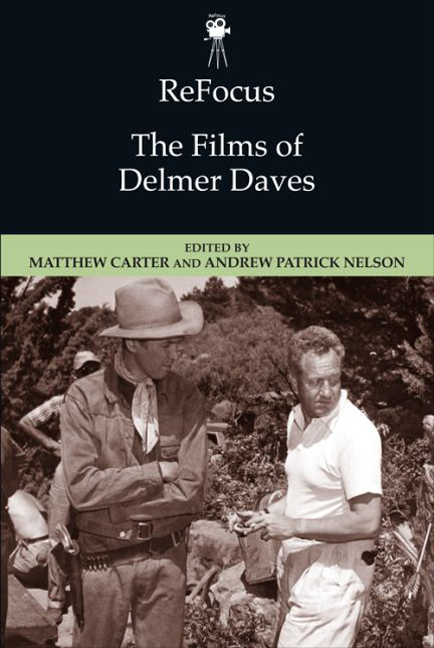Book contents
- Frontmatter
- Contents
- List of Figures
- Notes on Contributors
- Acknowledgments
- Introduction: “No One Would Know It Was Mine”: Delmer Daves, Modest Auteur
- 1 Don't Be Too Quick to Dismiss Them: Authorship and the Westerns of Delmer Daves
- 2 Trying to Ameliorate the System from Within: Delmer Daves’ Westerns from the 1950s
- 3 Bent, or Lifted Out by Its Roots: Daves' Broken Arrow and Drum Beat as Narratives of Conditional Sympathy
- 4 This Room is My Castle of Quiet: The Collaborations of Delmer Daves and Glenn Ford
- 5 Delmer Daves, Authenticity, and Auteur Elements: Celebrating the Ordinary in Cowboy
- 6 Home and the Range: Spencer's Mountain as Revisionist Family Melodrama
- 7 Delmer Daves’ 3:10 to Yuma: Aesthetics, Reception, and Cultural Significance
- 8 Changing Societies: The Red House, The Hanging Tree, Spencer's Mountain, and Post-war America
- 9 Partial Rehabilitation: Task Force and the Case of Billy Mitchell
- 10 “This Is Where He Brought Me: 10,000 Acres of Nothing!”: The Femme Fatale and other Film Noir Tropes in Delmer Daves’ Jubal
- Index
10 - “This Is Where He Brought Me: 10,000 Acres of Nothing!”: The Femme Fatale and other Film Noir Tropes in Delmer Daves’ Jubal
Published online by Cambridge University Press: 15 September 2017
- Frontmatter
- Contents
- List of Figures
- Notes on Contributors
- Acknowledgments
- Introduction: “No One Would Know It Was Mine”: Delmer Daves, Modest Auteur
- 1 Don't Be Too Quick to Dismiss Them: Authorship and the Westerns of Delmer Daves
- 2 Trying to Ameliorate the System from Within: Delmer Daves’ Westerns from the 1950s
- 3 Bent, or Lifted Out by Its Roots: Daves' Broken Arrow and Drum Beat as Narratives of Conditional Sympathy
- 4 This Room is My Castle of Quiet: The Collaborations of Delmer Daves and Glenn Ford
- 5 Delmer Daves, Authenticity, and Auteur Elements: Celebrating the Ordinary in Cowboy
- 6 Home and the Range: Spencer's Mountain as Revisionist Family Melodrama
- 7 Delmer Daves’ 3:10 to Yuma: Aesthetics, Reception, and Cultural Significance
- 8 Changing Societies: The Red House, The Hanging Tree, Spencer's Mountain, and Post-war America
- 9 Partial Rehabilitation: Task Force and the Case of Billy Mitchell
- 10 “This Is Where He Brought Me: 10,000 Acres of Nothing!”: The Femme Fatale and other Film Noir Tropes in Delmer Daves’ Jubal
- Index
Summary
Jubal (1956) is one of three Westerns that Delmer Daves made in successive years with actor Glenn Ford, the two others being 3:10 to Yuma (1957) and Cowboy (1958). As with most of Daves’ cinematic output, there has thus far been little academic writing on Jubal. This is a point well made by Kent Jones who, in one of his two introductory essays accompanying the 2013 Criterion Blu-Ray releases of 3: /10 and Jubal, writes: “Many of Delmer Daves’ films are beloved, but to say that he remains a misunderstood and insufficiently appreciated figure in the history of American movies is a rank understatement.” Despite his having directed two of the most celebrated Westerns of the so called “classical” era—in addition to 3:10, there is Broken Arrow (1950)—and despite his work across multiple genres, the film theorists who championed the talents of his contemporaries have somehow not awarded Daves the status of auteur. Whilst the likes of Anthony Mann, John Ford, and Howard Hawks are often among those most-praised, particularly as directors of Westerns, auteur theory seems to have passed Delmer Daves by. As Jones puts it, Daves “could be counted as one of its casualties.” Frankly, Daves’ reputation as one of the great directors of Hollywood Westerns could be cemented by Broken Arrow alone. However, what strikes one upon several viewings of his lesser-regarded Jubal are not its Western credentials (although these are clearly in evidence) but its relation to other classical-era Hollywood genres and styles. In particular, it is notable how farJubal's narrative is affected by film noir.
It is often said that through its most notorious trope, the femme fatale, the style of film noir presented a challenge to the dominant ideological values expressed by Hollywood: the male protagonist as hero, the heterosexual, monogamous couple, the family unit as social ideal, and, in particular, to the typically passive roles assigned female characters. On the other hand, it is thought that Westerns (along with other established Hollywood genres) are generally supportive of these values. Beyond celebrating frontier mythology through the “domestication of the wilderness,” the Western is understood to have championed male agency whilst reducing the role of the female in the narrative to that of a virtual cipher.
- Type
- Chapter
- Information
- ReFocus: The Films of Delmer Daves , pp. 199 - 221Publisher: Edinburgh University PressPrint publication year: 2016



